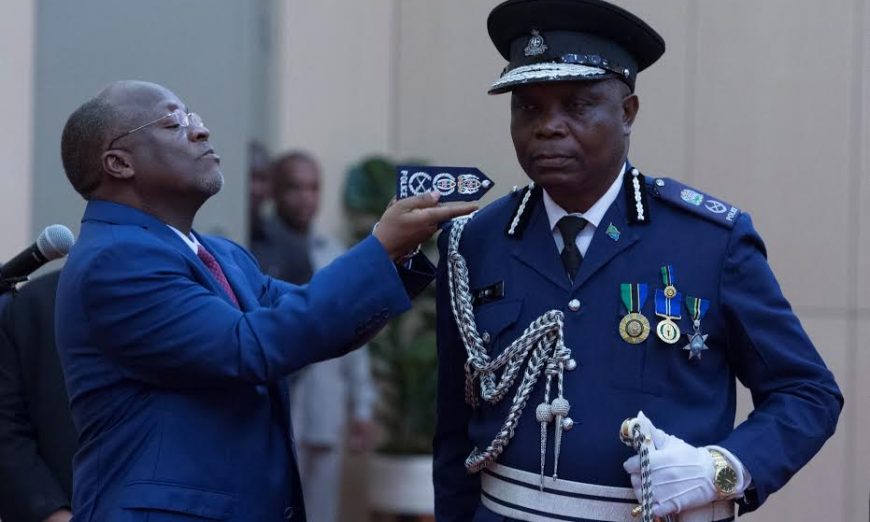PRESIDENT John Magufuli’s seemingly equivocal orders to police are clear instructions to kill and get away with it. His supporters claim he was misunderstood, but his body language and past records show something different.
Speaking to police officers at a function in Dar es Salaam on December 21, 2018, President Magufuli said: “In all that you have been doing all this period… you have not harassed or treated anyone unfairly. Keep on doing a good job with even a greater spirit… I want a police force that takes action. I don’t want a police officer taking action, and then getting prosecuted or incarcerated…. a policeman is in confrontation with a criminal, and he unfortunately gets the criminal to shoot himself… you shouldn’t arrest and prosecute him (for killing the criminal). Such a policeman should be congratulated and promoted, with a pay rise….”
Magufuli’s statement provides a loophole for arbitrary killings by police. Killing anyone is unlawful in Tanzania. Everyone is deemed innocent until proven guilty in a court of law. But Magufuli is making it sound like it is legal for police to shoot a “criminal” or to allege that the “criminal” shot and killed himself during a fierce confrontation.
In 2006, when some policemen shot dead suspects and caused public alarm, President Jakaya Kikwete ordered a quick investigation into the saga. The outcome of the investigation led to court charges against police officers implicated.
The laws are unchanged, but Magufuli is behaving in a way that turns him into a self-styled law giver. He is insinuating that “criminals” can be made an excuse for police taking someone’s life without trial. But, for those who know Magufuli well, in this sense, he means more than his utterances.
Moreover, this is not the first time Magufuli is ordering police to do as they wish in their treatment of civilians, particularly the opposition. His recent orders, however, are a clear indication that police brutality emanates from high level orders.
Magufuli may be using an allegory of a criminal, but clearly he means what he fears and hates most – opposition. For a president who has been criminalising opposition politics and criticism, and is bent on obliterating the opposition by all means; one who has openly said that his critics are traitors who must die, it is evident that he would buy in any explanation of police mistaking an opposition leader for a criminal, and killing him or her. At his worst, he is guaranteeing them exemption from punishment!
Magufuli’s statement brings back sad memories of an incident in which police mistakenly shot dead a university student, Aquilina Aquiline (22), as they were dispersing a crowd of opposition protesters in Kinondoni, Dar es Salaam on 16th February 2018. Several others, including Isack Ng’aga, Erick John, and Aida Ulomi, were injured with bullets.
As an immediate reaction to public pressure and criticism, and in effort to show responsibility and professionalism, police apprehended their own who had fired the bullet that killed the student – because it is easy to trace a fired bullet to a particular gun.
SAUTI KUBWA is informed that shortly before police took further action, “an order came from above ordering an immediate release of the suspects.” Instead, they were instructed to frame up criminal charges against opposition leaders who were marching with the crowd of supporters on the fateful evening preceding a parliamentary by-election.
This is how the killer was let loose, as leader of opposition Freeman Mbowe and his fellow party leaders found themselves in court, accused of, among other charges, causing Aquilina’s death.
Mbowe faces eight counts, including inciting hatred and rebellion against the government. Seven other top leaders of his party, Chadema, are accused of participating in the protest. In fact, they were marching to the offices of the District Executive Director for Kinondoni to demand official identification letters for their party agents who had been legally sworn in to oversee the by-election the following morning.
According to law, the letters – without which agents would not be allowed into voting centres – were supposed to have been provided seven days before election. Yet, it was less than 12 hours to go without any hope of getting them, while their ruling party counterparts had received them well in advance.
The government move, as it has always been, was meant to rig the by-election by using police to deny opposition agents entry into voting centres. And it was clear the law was being trampled on with “orders from above.”
Mbowe’s co-accused include Chadema secretary general Vincent Mashinji, deputy secretary generals John Mnyika and Salum Mwalimu, as well as members of parliament Peter Msigwa, Esther Matiko, John Heche and Halima Mdee.
It is because of this case that the opposition leader and Matiko are spending weeks in remand prison for allegedly jumping bail conditions. Magufuli is using police to harass the the opposition as a way of scaring all critics as he struggles to be let alone to run government business the way he wishes.
With such a statement endorsing police killings, Magufuli is setting a very bad precedent which, if left unchecked, does not augur well for the future of Tanzania. In April 2018, a young man, Suguta Chacha Suguta (27) was stabbed to death under police custody in Tarime. He happens to be younger brother to John Heche, an opposition Member of Parliament for Tarime Rural.
Since Magufuli’s coming to power in 2015, a list of innocent civilians getting wounded or losing lives in the hands of police has been on increase. At at time when decency demanded a reprimand from the president, he praised and encouraged police for mishandling the citizens whose lives they are supposed to protect, in the first place.










